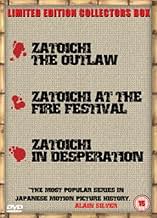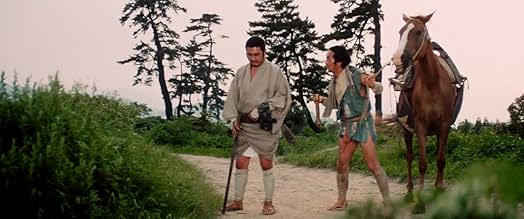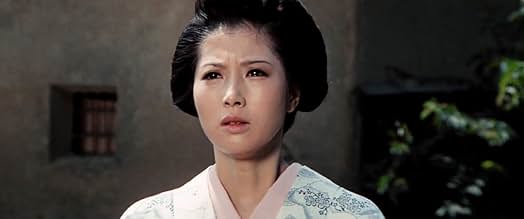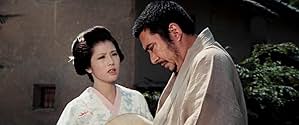ÉVALUATION IMDb
7,3/10
1,6 k
MA NOTE
Ajouter une intrigue dans votre langueZatoichi meets an infamous blind leader of a gangster organization as he contends with a gloomy ronin widower.Zatoichi meets an infamous blind leader of a gangster organization as he contends with a gloomy ronin widower.Zatoichi meets an infamous blind leader of a gangster organization as he contends with a gloomy ronin widower.
Histoire
Le saviez-vous
- AnecdotesThis is the twenty-first of 26 films to star Shintaro Katsu as Zatoichi.
- ConnexionsFollowed by Shin Zatôichi: Yabure! Tôjin-ken (1971)
Commentaire en vedette
Zatoichi Goes to the Fire Festival is the twenty-first entry in the Japanese franchise about the blind masseur, skilled swordsman and lowly yakuza. This is also by far the most experimental movie in the series so far and comes as an unexpected positive surprise. The vivid story line features several subplots. Let's just focus on the most essential elements. Zatoichi assists a mistress auction where he gives massages to bosses who want to sell or purchase women. Zatoichi seems to be overwhelmed by emotions when the most beautiful woman is sold for a hefty fee and decides to rescue her. However, the woman doesn't react to Zatoichi's gentle behavior and the disappointed swordsman lets her go when he realizes she wants to rob him out and run away. Things turn sour when the woman's husband suspects his wife to have slept with Zatoichi and decides to slay her and follow and ultimately confront her savior throughout the movie. Zatoichi however attends the reunion of some of the bosses who were present at the auction and decides to provoke the arrogant criminals as he despises their self-important swagger. However, he comes across a quite unusual boss named Yamikubo who is blind like Zatoichi but respected by his underlings. The two blind men challenge each other philosophically, intellectually and finally physically. In order to get rid of the troublesome Zatoichi, Yamikubo assigns his assigned successor's daughter to kill the emotional swordsman. In addition to this, an androgynous pimp also wants to kill Zatoichi to become a yakuza. Zatoichi needs to deal with a clever boss, an ambitious drag queen, a seductive protegee and a clever boss in this dynamic film.
Zatoichi Goes to the Fire Festival is my favorite film in the franchise so far for a multitude of reasons. First of all, the story is more adventurous than usual as it deals with unusual topics such as homosexuality and human trafficking. Secondly, the story is quite vivid and comes around with numerous memorable scenes. The bloody fight in the bath might be the most memorable fight scene in any film of the franchise and the final duel sees Zatoichi isolated on an artificial island surrounded by a ring of fire. Thirdly, the film takes some inspiration from Western cinema. The clever boss who challenges a dynamic Zatoichi reminds of Blofeld challenging James Bond in many aspects. The movie includes much more nudity than usually, including many naked yakuza as well as women whose phsyical features are presented in detail at an auction. Even the soundtrack has a vibe inspired by jazz and rock music at certain points but also still features Japanese folkloristic music. Fourthly, the characters in this film are all intriguing. This starts with unimportant side characters such as the bickering and slightly perverted couple who owns a teahouse. It goes on with supporting characters like the silent lady who is saved by Zatoichi or the homosexual pimp who wants to be seen as a real man. It culminates with two very interesting antagonists, the first being the jealous and nihilistic widow and the other one being the clever blind yakuza boss who is as cold as ice. Fifthly, the movie finds a perfectly balanced mixture between comic relief, tense fight sequences, a solid dose of suspense, a shot of tragic romance and some cultural elements thrown in to spice things up.
Obviously, this film is over the top which impresses me but which might irritate those who prefer more traditional chambara films. Homosexuality and nudity are everything but typical components for this type of movie. Some psychedelic flashbacks and experimental cuts also show that this movie was shot in the wild seventies and not in the more traditional sixties. Depending on your taste, this film could be the best but also the worst of the series.
To keep it short, watch this movie if you are craving for a more experimental take on traditional chambara movies after twenty rather streamlined entries in the franchise. Zatoichi Goes to the Fire Festival definitely stands out and is my favorite movie in the franchise up to that point. It deserves more acclaim and attention than it gets and could easily please to a wide audience. It's not the best film to start discovering the franchise because it's so experimental but it's a dynamic fun ride from start to finish you won't forget anytime soon.
Zatoichi Goes to the Fire Festival is my favorite film in the franchise so far for a multitude of reasons. First of all, the story is more adventurous than usual as it deals with unusual topics such as homosexuality and human trafficking. Secondly, the story is quite vivid and comes around with numerous memorable scenes. The bloody fight in the bath might be the most memorable fight scene in any film of the franchise and the final duel sees Zatoichi isolated on an artificial island surrounded by a ring of fire. Thirdly, the film takes some inspiration from Western cinema. The clever boss who challenges a dynamic Zatoichi reminds of Blofeld challenging James Bond in many aspects. The movie includes much more nudity than usually, including many naked yakuza as well as women whose phsyical features are presented in detail at an auction. Even the soundtrack has a vibe inspired by jazz and rock music at certain points but also still features Japanese folkloristic music. Fourthly, the characters in this film are all intriguing. This starts with unimportant side characters such as the bickering and slightly perverted couple who owns a teahouse. It goes on with supporting characters like the silent lady who is saved by Zatoichi or the homosexual pimp who wants to be seen as a real man. It culminates with two very interesting antagonists, the first being the jealous and nihilistic widow and the other one being the clever blind yakuza boss who is as cold as ice. Fifthly, the movie finds a perfectly balanced mixture between comic relief, tense fight sequences, a solid dose of suspense, a shot of tragic romance and some cultural elements thrown in to spice things up.
Obviously, this film is over the top which impresses me but which might irritate those who prefer more traditional chambara films. Homosexuality and nudity are everything but typical components for this type of movie. Some psychedelic flashbacks and experimental cuts also show that this movie was shot in the wild seventies and not in the more traditional sixties. Depending on your taste, this film could be the best but also the worst of the series.
To keep it short, watch this movie if you are craving for a more experimental take on traditional chambara movies after twenty rather streamlined entries in the franchise. Zatoichi Goes to the Fire Festival definitely stands out and is my favorite movie in the franchise up to that point. It deserves more acclaim and attention than it gets and could easily please to a wide audience. It's not the best film to start discovering the franchise because it's so experimental but it's a dynamic fun ride from start to finish you won't forget anytime soon.
- kluseba
- 21 mars 2018
- Lien permanent
Meilleurs choix
Connectez-vous pour évaluer et surveiller les recommandations personnalisées
- How long is Zatoichi Goes to the Fire Festival?Propulsé par Alexa
Détails
- Date de sortie
- Pays d’origine
- Langue
- Aussi connu sous le nom de
- Zatoichi Goes to the Fire Festival
- sociétés de production
- Consultez plus de crédits d'entreprise sur IMDbPro
- Durée1 heure 36 minutes
- Rapport de forme
- 2.35 : 1
Contribuer à cette page
Suggérer une modification ou ajouter du contenu manquant

Lacune principale
By what name was Zatôichi abare-himatsuri (1970) officially released in India in English?
Répondre





























